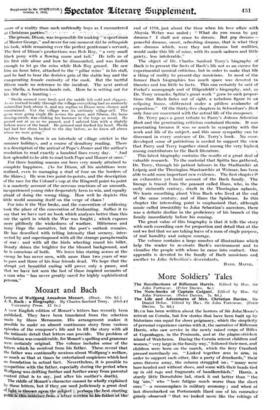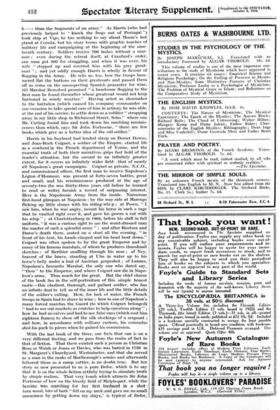More Soldiers' Tales
The Recollections of Rifleman Harris. Edited by Hon. Sir.
Mucu has been written about the horrors of Sir John Moore's retreat on Coruna, but few stories that have been built up by
historians can equal for sheer poignancy, which the simplicity of personal experience carries with it, the narrative of Rifleman. Harris, who saw service in the newly raised corps of Rifles at Copenhagen, in the Peninsula, and at the plague-stricken island of Wakheren. During the Connie retreat children and women," very large in the family way," followed their men, and
children were born on the march, which the fiery Crauford pressed mercilessly "Linked together arm in aim," in order to support each other, like a party of drunkards," theiT
arms thrown away, the column struggled 'oh ; "'many were bare-headed and without shoes, and some with their heads tied up in old. rags and fragments of handkerchiefs." Harris, a- sturdy little Dorsetshire lad, stuck it ont better than " the big 'uns," who " bore fatigue much worse than the short ones."--a commonplace- in military economy and when at last disembarked on Portsmouth Hard one of his comrades' grimly--observed r " that we- looked more r.dc the 'rakings of
h than -the fragments of an army." As* Harris (who had previously helped to " knock the frogs out of Portugal ") took ship at Vigo, he has nothing to say about Moore's last stand at Corufia, but his story teems with graphic touches of military life and campaigning at the beginning of the nine- teenth century. Soldiers receive 700 lashes without a mur- mur ; even during the retreat itself, at Craufurd's order, one man got 300 for straggling, and when it was over, his wife stepped up and covered him with his grey great- coat " ; and yet oddly enough Harris is wholly in favour of flogging in the Army. He tells us, too, how the troops ham- mered flat the buttons on their greatcoats and passed them off as coins on the unsuspecting Spanish peasantry for wine, till Marshal Beresford promised " a handsome flogging to the first man he found thereafter whose greatcoat would not keep buttoned in windy weather." Having acted as shoemaker to the battalion (which caused his company commander on one occasion to take special care of him in action), he was able, at the end of his service, to settle down as a cobbler " strapping away in my little shop in Richmond Street, Soho," where one Mr. Curling found him and took down his rambling reminis- cences than which, says Sir John Forteseue, there are few books which give us a better idea of the old soldier."
Harris in his boyhood had tended sheep on Dorset Downs, and Jean-Roth Coignet, a soldier of the Empire, started life as a cowherd in the French department of Yonne, and the essential truth of both their narratives grips fast hold of the reader's attention, but the second to an infinitely greater extent, for it covers an infinitely wider field—that of nearly all Napoleon's great campaigns. Coignet as private, N.C.O., and commissioned officer, the first man to receive Napoleon's Legion d'Honneur, was present at forty-seven battles, great' and small, and his reminiscences produced at the age of seventy-two (he was thirty-three years old before he learned' to read or write) furnish a record of surpassing interest. i4ere is the Napoleonic Army from the inside. Numeroui first-hand glimpses at Napoleon : by the way-side at Marengo' flicking up little stones with his,riding-whi p ; at Posen, " I saw him, when he was angry, Mona his horse in such a rage that he vaulted right over it, and gave his groom a cut with his whip " ; at Charlottenburg in 1806, before his staff in full uniform, " it was a curious sight to see the worst-dressed man the master of such a splendid army " ; and after Bautzen and Duroc's death there, seated on a stool all the evening, " in front of his tent, his hands clasped and his head bent down." Coignet was often spoken to by the great Emperor and by many of his famous marshals, of whom he produces thumbnail sketches : of Berthier snuffling through his nose ; of Ney; bravest of the brave, standing at 1L'Lm in water up to his horse's belly under a hail of Austrian grapeshot ; of Lannes, Napoleon's favourite Marshal, the olily one who dared say, " thou " to the Emperor, and whom Coignet saw die in Napo- leon's arms. Thus much for the great. But the chief charm of the book lies in the self-portraiture of this simple honest rustic—this obedient, thorough, and gallant soldier, who has an infinite deal to tell us of the inner life and the little details of the soldier's calling. How, for lack of water, the French troops in Spain had to shave in wine ; how in one of Napoleon's many forced marches the Guard (to which Coignet belonged) " had to use our muskets as crutches to help ohrselyes along " bow he had no calves and had to me false ones (which cost him eighteen francs) to show off the silk stockings of a sergeant ;. and how, in accordance with military custom, his comrades shot his pack to pieces when he gained his commission.
With the last book of the three, one feels that one is on a very different footing, and we pass from the realm of fact to that of fiction. That there existed such a person as Christian Ross or Welsh or Jones or Davies, who was buried in 1739 in St. Margaret's Churchyard, Westminster, and that she served as a man in the ranks of Marlborough's armies and afterwards followed them as a camp suttler, is no doubt, true. But her. story as now presented to us is pure Defoe, which is to say. that it is on the whole fiction artfully trying to simulate truth- by simple realism. That very touch which attracts Sir John Fortescue of how on the bloody field of Malplaquet, while the heroine was searching for her first husband in a shot- • torn wood, bits of bark-" fell on my neck and gave me no small uneasiness by getting down my stays," is typical of. Defoe.























































 Previous page
Previous page